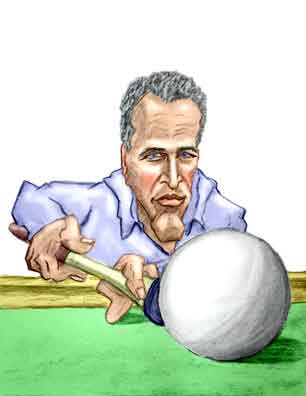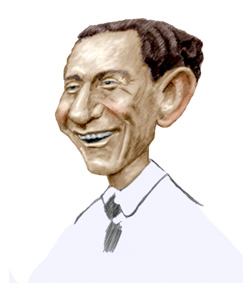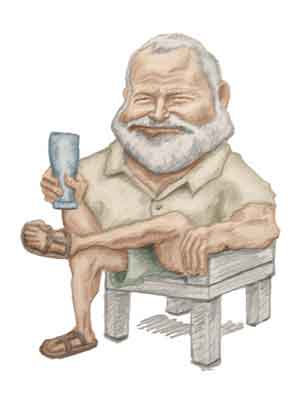Paul Newman, Ernest Hemingway, and the Worst Novel Ever Written

Paul Neman
In the Right Place?
Although Paul Newman was one of the most famous - and best - actors of the Twentieth Century (and spilling over into the Twenty-First), it is possible - possible, mind you - we would never have heard of him except for what is arguably the worst book ever written by an American author - or any other author for that matter.
After World War II, a young law graduate of Washington University in St. Louis, Aaron Edward Hotchner - then called "Ed" by his friends - had gotten his discharge from the Air Force. After two years in Paris spending his severance pay, he wondered whether a pre-war offer to work for Cosmopolitan Magazine still stood. Unfortunately, it didn't. But Ed was told he could act as a free lance assignment agent for the magazine. That is, he would contact famous authors to see if they would write stories or articles. If they did, Ed would get a commission. With nothing better in sight, Ed accepted.
Then in the summer of 1948, Ed walked into the Cosmopolitan office, and the editor told him to get on a plane, fly to Cuba, and ask Ernest Hemingway to write an article on "The Future of Literature". Although you would think Ed would have leapt at the opportunity to meet the most famous author alive (and one of his boyhood literary heroes) actually he was petrified by the idea. He also thought asking a novelist to write a speculative think-piece ridiculous. But it was see Ernest or kiss his Cosmopolitan job good-by. So Ed flew to Havana.
But instead of knocking on the front gate of Ernest's Finca Vigia, Ed wrote Ernest a note explaining his mission and said he didn't want to bother him about writing an absurd article about the Future of Literature. A written refusal would also be nice, he added, for the Future of Hotchner. Hemingway, apparently impressed by Ed's courtesy, called him the next morning and arranged a meeting at a local bar. Ernest and Ed drank daiquiris, ate shrimp, and talked a bit. The next morning they went deep sea fishing, and before Ed left for New York, Ernest had agreed to write the article.

A. E. Hotchner
"Hotch"
Although the "The Future of Literature" was never written, Ernest got Cosmopolitan to let him submit some fiction instead. He said he'd substitute two short stories for one article, but the fee had to up from $15,000 to $25,000. That was big, big bucks in the day, particularly since if Ernest kept out of the US for a year, the money was tax free.
By then Ed - soon dubbed "Hotch" by Ernest - became Ernest's de facto agent for the magazine. When one of the stories ended up growing into the novel, Across the River and Into the Trees, Ernest told Hotch to tell his editors the price was now $85,000 for serialization rights. That was such an incredibly generous fee that Cosmopolitan, after first agreeing, tried later to back out of the deal. But the contract had been signed.
Most critics said Across the River was horrible, certainly Hemingway's poorest novel (an opinion shared by Ernest's fourth wife, Mary, to whom he dedicated the book). One newspaper editor even said it was the worst novel he had ever read. The trouble was by that time Ernest had become so-wrapped up in his public persona that he tried to project the image of the Most-Macho-But-Very-Sensitive-Ernest Hemingway to the world. So what you have in Across the River is a book of Ernest Hemingway trying to write like Ernest Hemingway, but not like the Old Ernest Hemingway, instead the New Ernest Hemingway. You end up with unintentional self-parody.
By now Ernest and Hotch were good friends. With the book written and the $85,000 in his pocket, Ernest decided to take a vacation to Paris and Venice. Ernest wanted Hotch to come along, but Hotch had to make a living. So Ernest told Hotch to tell their editor that he was going to keep and "polish" the last few chapters. He'd send them later. Naturally the editor almost had a cow and said Hotch had to go with Ernest and make sure he got the chapters done in time for the final installment. Hotch wasn't gone too long - two, maybe three weeks - but whether it was what amounted to an all expense paid vacation at Cosmo's expense or some other reason, when Hotch got back with the chapters (which he almost lost), he found was no longer welcome at the magazine.

Did Papa's worst novel ultimately make Paul a star?
So Hotch turned to free lance writing, and by 1953 he was earning a respectable living. Then he got a call from Ernest. Watching television was rapidly becoming the national American pastime, and producers of the small silver screen were bombarding Ernest with offers to adapt his stories and books. Ernest, who hated interruptions of any kind, asked Hotch to handle the TV hordes. Hotch agreed and not only served as Ernest's contact, but also began to write TV adaptations and screenplays for some of Ernest's stories.
One of the stories Hotch adapted (with Sidney Carroll) was "The Battler" for Playwrights 56 (although the show was first aired in 1955). "The Battler" was a tale of a young man named Nick Adams who was bumming his way around the country. While riding the rails, Nick gets thrown off the train by a brakeman. Continuing on foot he finds two men camping by the side of the track. One was a former championship boxer named Ad Francis. Ad, once rich and famous, was now a punch drunk bum and subject to fits of irrational behavior ("I'm crazy," he tells Nick). Traveling with Ad was a black man named Bugs, and they invited Nick to join them for their dinner of ham and egg sandwiches.
As Bugs cooks dinner, a seemingly non-incident about Nick's knife sends Ad off into a frenzy where he challenges Nick to a fight. To protect Nick, Bugs sneaks up and knocks Ad out with a blackjack. He then politely asks Nick to move on since seeing Nick might send Ad into another frenzy. The story ends with Nick walking down the track.
To make a five page story into a one hour television play, Hotch had to expand the plot and so he had Nick bumming around before he came across Ad and Bugs plus adding flashbacks into Ad's life. Arthur Penn (who ten years later sat in the chair for Bonnie and Clyde) directed the show, and the producers scored a coup when they got Hollywood's top bad-boy actor, James Dean, to play the part of Ad Francis. Filming and broadcast were scheduled for October.
Then on September 30, James Dean was killed in a car wreck. The only thing to do was to recast the actor slated to play Nick Adams as Ad Francis. That was (of course) the young Paul Newman. At the time Paul only had one screen credit to his name, but he played the part of the fighter so well, he was immediately offered the part of Rocky Graziano in Somebody Up There Likes Me. The movie was a hit, and Paul became a star.
There you have it. Ernest wrote arguably one of the worst books in American literature which got Hotch into free lancing who then wrote a TV script which was supposed to star James Dean who was killed in a car accident which put the leading role onto Paul Newman who performed so well he was offered the starring role of a hit film and then went on to become one of Hollywood's iconic stars.
Of course, Paul's ability and talent helped a bit, too. So it was a bit more than just being in the right place at the right time.
You'll find it blazoned on the internet that James Dean was first picked to play the lead in Somebody Up There Likes Me and Paul was substituted after James was killed. That the substitution happened for The Battler, though, is related by Hotch himself, who was, after all, there.
By the way, Hotch and Paul became lifelong friends. It was Hotch who was Paul's partner in the Newman's Own line of food products whose profits go for his "Hole in the Wall Gang" for children with serious illnesses.
References.
Papa Hemingway: A Personal Memoir, A. E. Hotchner, Random House (1966). This is Hotch's very readable account. He mentions in passing the story of Paul being cast in "The Battler".
Hotch doesn't go into detail on the circumstances of his leaving Cosmopolitan, and the reader might be led from a conversation Hotch had with Ernest in Paris that Hotch decided to go into free lancing after returing to America. But in Carlos Baker's Ernest Hemingway: A Life Story, Carlos mentions a letter from Hotch to Ernest that the departure was not Hotch's decision. Also a quote related in Papa Hemingway from Ernest about "the bad luck" he caused Hotch supports Carlos' version which is definitely confirmed in "Dear Papa, Dear Hotch: The Correspondence of Ernest Hemingway" cited below.
Choice People: The Greats, Near Greats and Ingrates I Have Known, A. E. Hotchner, William Morrow Company (1984). Actually an even better book than Papa Hemingway. A chapter has the story about Paul being cast in "The Battler", and there is a great photo of Paul and Hotch making their salad dressing.
Dear Papa, Dear Hotch: The Correspondence of Ernest Hemingway and A. E. Hotchner, Albert J. DeFazio III (Editor), University of Missouri Press (2005). From Hotch and Papa's correspondence, we see Hotch was "Ed" for the first few years. After he and Ernest got to be good friends, it was "Hotch", and from Hemingway's love for nicknames, we can reliably conclude it was Papa who bestowed the name.
How It Was, Mary Hemingway, Knopf, 1976. Among items like telling how Ernest would throw wine in her face if he got irritated with her, Mary tells us that she thought Across the River dedicated "To Mary, with Love" was Ernest's poorest novel. Most critics agreed.